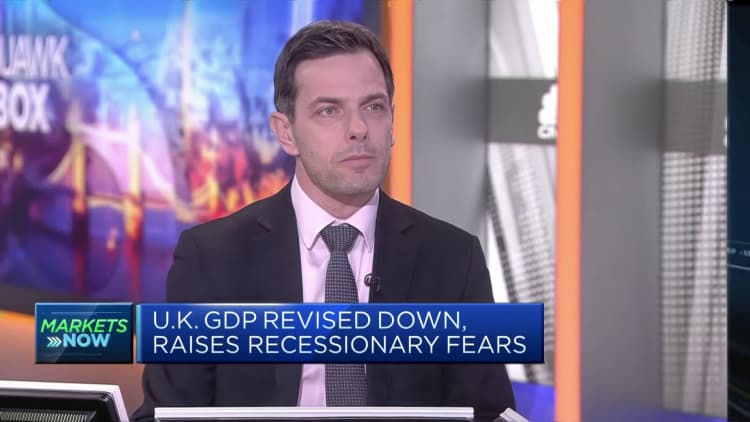UK inches closer to technical recession as growth is revised down
[ad_1]
People shopping on Oxford Street in London. Picture date: Thursday December 29, 2022. (Photo by James Manning/PA Images via Getty Images)
James Manning – Pa Images | Pa Images | Getty Images
LONDON — The U.K. is edging closer to recession after revised figures showed the economy shrank in the previous quarter.
U.K. gross domestic product (GDP) fell by 0.1% between July and September, a downward revision from the earlier estimate of flat growth, according to new data released Friday by the Office for National Statistics.
There was also zero growth in the prior three months, the new figures showed, down from the 0.2% growth previously calculated.
Data due out in February will show whether the U.K. has entered a technical recession — defined as when the economy shrinks for two consecutive quarters.
Responding to the revisions Friday, Finance Minister Jeremy Hunt insisted that the “medium-term outlook for the U.K. is far more optimistic than these numbers suggest.”

However, analysts said it shows that the U.K. has so far just “scraped by” without a recession.
“Growth is weakening and interest rates are really beginning to bite and while a recession has just been avoided to date, there is no guarantee one will be avoided in 2024,” Richard Carter, head of fixed interest research at Quilter Cheviot, said in a note.
“Inflation has eased more than anticipated and interest rate predictions are suggesting more easing than originally thought in 2024, but the damage may already have been done. Certainly, Rishi Sunak’s pledge to grow the economy is now severely in doubt,” he said.
That could put further pressure on the Bank of England to cut interest rates sooner than planned in a bid to shore up a weaker economy.
Better-than-expected data released Wednesday showed that inflation hit 3.9% in November, raising speculation that the central bank could cut rates in the spring.
Prime Minister Rishi Sunak has made growing the economy one of his key pledges this year. Downing Street said it will be met if GDP increases in the three months to December versus the previous quarter.
A near-term drop in interest rates would be a win for Sunak’s government, as the U.K. enters an election year.
Still, the BOE’s governor Andrew Bailey has insisted that rates may need to remain “higher for longer” after holding them steady at 5.25% at the final policy meeting of the year.
[ad_2]




